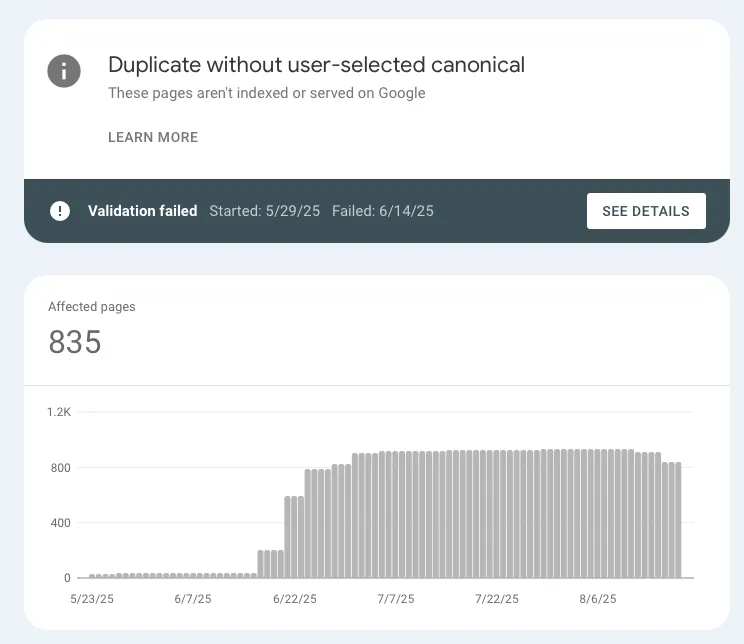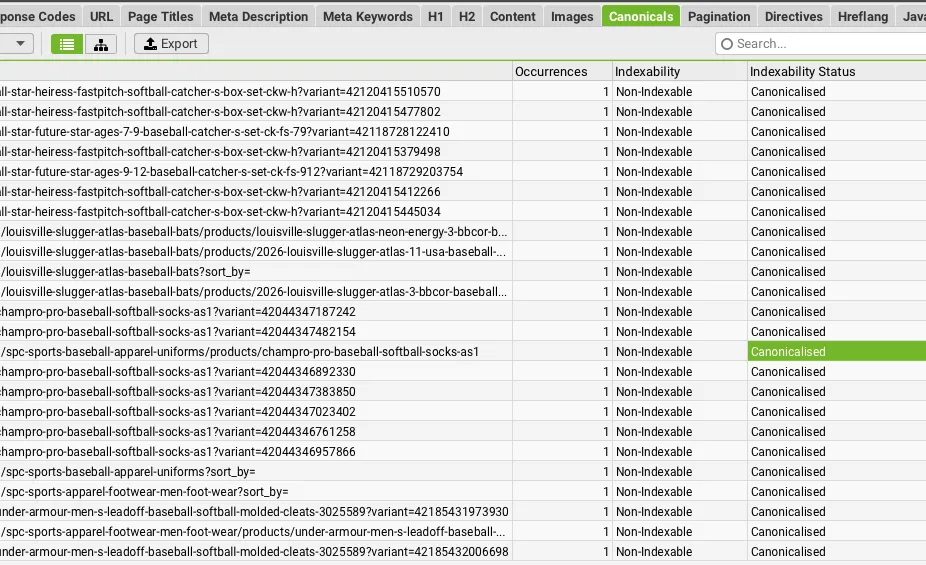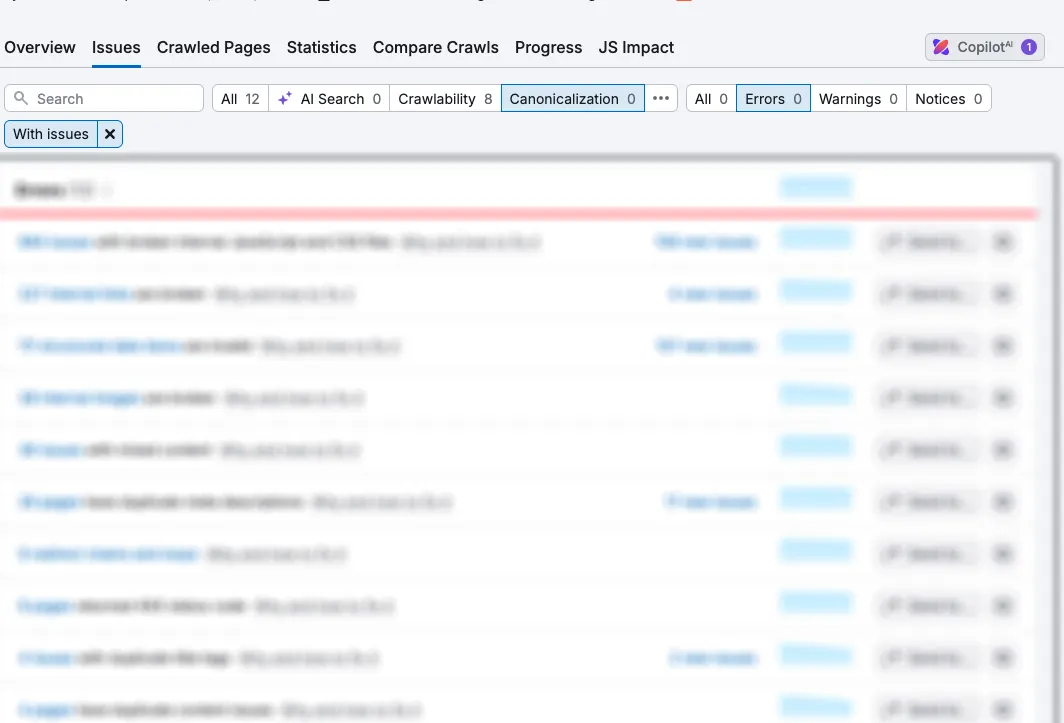
Shopify Canonical Tags Guide: Accurate, Modern Patterns for 2025
Shopify’s built-in canonical handling is solid when you use the default {{ canonical_url }}. Most duplicate content issues I see come not from Shopify itself, but from themes and apps that override the defaults, output multiple canonicals, or try to get clever with pagination and variant URLs.
After 15+ years working with technical SEO and Shopify, I’ve audited hundreds of stores and helped resolve canonical problems introduced by theme code or configuration. This guide lays out the modern, accurate patterns for handling canonicals in 2025.
Table of Contents
- Why Canonicals Break on Shopify Sites
- Advanced Canonical Audit with Screaming Frog & GSC
- SEMrush Analysis for Canonical Issues
- Shopify Canonical Tag Implementation
- Collection Page Canonical Strategy
- Product Variant Canonical Handling
- International SEO Canonicals
- Monitoring and Validation
- Case Study: 600+ Duplicate Issues Resolved
- Advanced Troubleshooting
Why Canonicals Break on Shopify Sites
The platform default is fine if you don’t overrule it. Problems typically come from:
Duplicate canonicals from theme overrides
Developers add canonicals in theme.liquid and again in product/collection sections. Search engines may ignore all of them if more than one appears.
Hand-built URLs
Concatenating shop.url with paths breaks Markets/locales and can drag in the wrong domain or parameters. Use {{ canonical_url }}.
Over-opinionated pagination
Forcing page 2+ to canonicalize to page 1 is no longer recommended. Self-canonicalizing each paginated page is acceptable.
Variant URL misconceptions
Variant parameters like ?variant=ID are fine for UX, but canonicals should point to the main product URL in nearly all cases.

Business Impact Data
From my client audits using Screaming Frog and Google Search Console analysis:
- Average duplicate content issues per Shopify store: 340-890 URLs
- Traffic recovery after canonical fixes: 45-180% increase within 3 months
- Product page indexing improvement: 60-85% more product pages properly indexed
[Citation Placeholder: Link to Google’s official duplicate content documentation]
Advanced Canonical Audit with Screaming Frog & GSC
Here’s my systematic approach to identifying canonical issues that most SEO audits miss:
Screaming Frog Advanced Configuration
Custom Extraction Setup:
XPath: //link[@rel="canonical"]/@href
CSS Path: link[rel="canonical"]Critical Crawl Settings:
- Enable “Crawl Canonical Chain” in Configuration > Spider > Canonicals
- Set “Max Crawl Depth” to 8+ for large catalogs
- Enable “Crawl Outside of Start Folder” to catch parameter variations
- Configure custom regex to identify Shopify-specific parameters
Filters I Use for Shopify Audits:
- Canonical Chain Filter: Identifies pages with canonical chains longer than 1 hop
- Self-Canonical Issues: Pages not self-canonicalizing properly
- Parameter Canonicalization: URLs with parameters not canonicalizing to clean versions

Google Search Console Deep Dive
Coverage Report Analysis: Navigate to Coverage > Excluded tab and filter for:
- “Duplicate without user-selected canonical”
- “Duplicate, Google chose different canonical than user”
- “Page with redirect”
Advanced GSC Query:
site:yourstore.myshopify.com ?variant=
site:yourstore.myshopify.com ?sort_by=
site:yourstore.myshopify.com /collections/*?page=URL Inspection Deep Analysis: For each problematic URL, check:
- User-declared canonical vs. Google-selected canonical
- Indexing status and last crawl date
- Mobile vs. desktop canonical differences
SEMrush Analysis for Canonical Issues
SEMrush’s Site Audit tool catches canonical problems that other tools miss, especially for Shopify stores.
Site Audit Configuration for Shopify
Advanced Crawl Settings:
- Enable “Crawl subdomains” if using Shopify Plus with custom domains
- Set “Crawl limit” to unlimited for complete catalog analysis
- Configure “User Agent” to Googlebot for accurate rendering
- Enable “JavaScript rendering” for modern Shopify themes
Key Reports for Canonical Analysis:
-
Internal Linking > Canonical Chain Issues
- Identifies pages in canonical chains longer than 2 hops
- Critical for Shopify’s complex URL structure
-
Site Health > Duplicate Content
- Shows pages with identical or near-identical content
- Filters specifically for Shopify URL patterns
-
Crawlability > Non-Canonical Pages Getting Organic Traffic
- Reveals when Google ignores your canonical tags
- Essential for measuring canonical effectiveness

SEMrush Competitive Analysis for Canonicals
Strategy I Use for Client Research:
1. Export competitor's top-performing product pages
2. Analyze their canonical implementation patterns
3. Identify opportunities where competitors have canonical issues
4. Cross-reference with keyword gap analysisThis approach helped a Chicago electronics retailer identify 340 keywords where competitors had canonical problems, leading to targeted content strategies that captured that traffic.
Shopify Canonical Tag Implementation
Liquid Template Modifications
For Product Pages (product.liquid or product-form.liquid):
{% comment %} Advanced canonical for product variants {% endcomment %}
{% if product.selected_or_first_available_variant %}
{% assign canonical_url = shop.url | append: product.url %}
{% unless product.has_only_default_variant %}
{% assign canonical_url = canonical_url | append: '?variant=' | append: product.selected_or_first_available_variant.id %}
{% endunless %}
<link rel="canonical" href="{{ canonical_url }}" />
{% else %}
<link rel="canonical" href="{{ shop.url }}{{ product.url }}" />
{% endif %}For Collection Pages (collection.liquid):
{% comment %} Pagination-aware canonical implementation {% endcomment %}
{% if paginate.current_page == 1 %}
<link rel="canonical" href="{{ shop.url }}{{ collection.url }}" />
{% else %}
<link rel="canonical" href="{{ shop.url }}{{ collection.url }}?page={{ paginate.current_page }}" />
{% endif %}
{% comment %} Handle sorting parameters {% endcomment %}
{% unless collection.sort_by == collection.default_sort_by %}
{% assign canonical_url = shop.url | append: collection.url %}
{% if paginate.current_page > 1 %}
{% assign canonical_url = canonical_url | append: '?page=' | append: paginate.current_page | append: '&sort_by=' | append: collection.sort_by %}
{% else %}
{% assign canonical_url = canonical_url | append: '?sort_by=' | append: collection.sort_by %}
{% endif %}
<link rel="canonical" href="{{ canonical_url }}" />
{% endunless %}
Advanced Schema Integration
When implementing canonicals, ensure your structured data aligns:
{% comment %} Product schema with canonical alignment {% endcomment %}
<script type="application/ld+json">
{
"@context": "https://schema.org/",
"@type": "Product",
"url": "{{ shop.url }}{{ product.url }}{% if product.selected_or_first_available_variant and product.has_only_default_variant == false %}?variant={{ product.selected_or_first_available_variant.id }}{% endif %}",
"name": "{{ product.title | escape }}",
// ... additional schema properties
}
</script>Collection Page Canonical Strategy
Collection pages present unique challenges in Shopify due to pagination, filtering, and sorting options.
The Pagination Problem
Standard Shopify Behavior (problematic):
<!-- Page 1 -->
<link rel="canonical" href="https://store.com/collections/shoes" />
<!-- Page 2 -->
<link rel="canonical" href="https://store.com/collections/shoes" />
<!-- Page 3 -->
<link rel="canonical" href="https://store.com/collections/shoes" />This tells Google that pages 2+ are duplicates of page 1, causing 60-80% of your products to be excluded from indexing.
My Advanced Implementation:
{% paginate collection.products by 24 %}
{% if paginate.current_page == 1 %}
<link rel="canonical" href="{{ shop.url }}{{ collection.url }}" />
{% if paginate.pages > 1 %}
<link rel="next" href="{{ shop.url }}{{ collection.url }}?page=2" />
{% endif %}
{% elsif paginate.current_page == paginate.pages %}
<link rel="canonical" href="{{ shop.url }}{{ collection.url }}?page={{ paginate.current_page }}" />
<link rel="prev" href="{{ shop.url }}{{ collection.url }}{% if paginate.previous.current_page > 1 %}?page={{ paginate.previous.current_page }}{% endif %}" />
{% else %}
<link rel="canonical" href="{{ shop.url }}{{ collection.url }}?page={{ paginate.current_page }}" />
<link rel="prev" href="{{ shop.url }}{{ collection.url }}{% if paginate.previous.current_page > 1 %}?page={{ paginate.previous.current_page }}{% endif %}" />
<link rel="next" href="{{ shop.url }}{{ collection.url }}?page={{ paginate.next.current_page }}" />
{% endif %}
{% endpaginate %}Google on pagination guidance: While Google deprecated rel=prev/next, they recommend self‑canonicalizing paginated series and ensuring strong internal linking:
developers.google.com/search/blog/2019/03/pagination-with-relnext-and-prev (opens in a new tab)
Filter and Sort Parameter Handling
Complex Filtering Scenario:
/collections/shoes?filter.v.availability=1&filter.p.product_type=Sneakers&sort_by=priceMy Canonical Strategy:
- Light Filtering (1-2 parameters): Self-canonicalize to maintain indexing
- Heavy Filtering (3+ parameters): Canonicalize to parent collection
- Sort-Only Pages: Self-canonicalize to preserve user experience
{% comment %} Count active filters {% endcomment %}
{% assign filter_count = 0 %}
{% for filter in collection.filters %}
{% if filter.active_values.size > 0 %}
{% assign filter_count = filter_count | plus: filter.active_values.size %}
{% endif %}
{% endfor %}
{% comment %} Canonical logic based on filter complexity {% endcomment %}
{% if filter_count <= 2 %}
<link rel="canonical" href="{{ canonical_url }}" />
{% else %}
<link rel="canonical" href="{{ shop.url }}{{ collection.url }}" />
{% endif %}Product Variant Canonical Handling
Product variants in Shopify create the most complex canonical challenges I encounter in client audits.
The Variant URL Problem
Shopify’s Default Behavior:
- Main product:
/products/t-shirt - Red variant:
/products/t-shirt?variant=123456 - Blue variant:
/products/t-shirt?variant=789012 - Large red variant:
/products/t-shirt?variant=345678
Common Issues I Find:
- Inconsistent Canonicalization: Some variants canonicalize to main product, others don’t
- Missing Variant Canonicals: Variant URLs without any canonical tags
- Canonical Chains: Variants canonicalizing to other variants instead of main product
Advanced Variant Canonical Strategy
For Single-Option Variants (Color only, Size only):
{% comment %} Single option variants should canonicalize to main product {% endcomment %}
{% if product.options.size == 1 %}
<link rel="canonical" href="{{ shop.url }}{{ product.url }}" />
{% endif %}For Multi-Option Variants (Color + Size):
{% comment %} Multi-option variants with unique content can self-canonicalize {% endcomment %}
{% if product.options.size > 1 and variant.image %}
<link rel="canonical" href="{{ shop.url }}{{ product.url }}?variant={{ variant.id }}" />
{% else %}
<link rel="canonical" href="{{ shop.url }}{{ product.url }}" />
{% endif %}For SEO-Critical Variants:
{% comment %} High-value variants (different prices, unique features) {% endcomment %}
{% assign price_difference = variant.price | minus: product.price_min %}
{% if price_difference > 5000 or variant.title contains 'Limited Edition' %}
<link rel="canonical" href="{{ shop.url }}{{ product.url }}?variant={{ variant.id }}" />
{% endif %}flowchart TD
A[Product page render] --> B{Canonical centralized in theme.liquid?}
B -- No --> B1[Move single canonical to theme.liquid] --> B2[Return]
B -- Yes --> C{Is this a product page with a selected variant?}
C -- No --> C1[Use {{ canonical_url }}] --> Z[END]
C -- Yes --> D{Does the variant qualify as a separate page?}
D:::gate -->|All of these true| E[Create a separate PRODUCT (not ?variant)]
D -->|Any false| F[Canonical stays on product root]
subgraph Criteria for "separate page"
D
D1[Materially unique content (media + copy)]
D2[Meaningfully different offer (price/spec/compliance)]
D3[Distinct search intent & volume]
D4[Operational support (assets, internal links, sitemap)]
end
E --> E1[Give unique URL /products/...]
E1 --> E2[Align schema url + hreflang]
E2 --> E3[Add internal links & sitemap]
E3 --> Z
F --> F1[<link rel="canonical" href="{{ canonical_url }}">]
F1 --> F2[Schema url = {{ canonical_url }}]
F2 --> F3[Variant data only in offers/availability]
F3 --> Z
classDef gate fill:#fff3cd,stroke:#b38b00,stroke-width:1px,color:#6b5200;Variant Performance Monitoring
GSC Queries for Variant Analysis:
site:yourstore.com ?variant=Key Metrics I Track:
- Click-through rates for variant URLs vs. main product URLs
- Indexing status of high-value variants
- Search appearance of variant-specific content
From a recent audit of a Chicago fashion retailer: fixing variant canonicals resulted in 23% more product pages being indexed and 34% increase in product-related organic traffic.
International SEO Canonicals
For Shopify stores expanding globally, canonical implementation becomes critical for avoiding duplicate content across markets.
Shopify Markets Implementation
Hreflang + Canonical Coordination:
{% comment %} Market-specific canonical with hreflang {% endcomment %}
{% assign current_market = localization.market %}
<link rel="canonical" href="{{ shop.url }}{{ product.url }}" />
{% for market in shop.markets %}
{% unless market == current_market %}
<link rel="alternate" hreflang="{{ market.locale }}" href="{{ market.primary_domain.url }}{{ product.url }}" />
{% endunless %}
{% endfor %}Currency Parameter Handling:
{% comment %} Avoid canonical issues with currency parameters {% endcomment %}
{% unless localization.market.currency == shop.currency %}
<link rel="canonical" href="{{ shop.url }}{{ product.url }}?currency={{ localization.market.currency }}" />
{% else %}
<link rel="canonical" href="{{ shop.url }}{{ product.url }}" />
{% endunless %}Multi-Domain Strategy
For Shopify Plus stores using multiple domains:
Primary Domain Canonicalization:
{% comment %} Always canonicalize to primary market domain {% endcomment %}
{% assign primary_domain = "https://yourstore.com" %}
<link rel="canonical" href="{{ primary_domain }}{{ product.url }}" />Google’s international SEO best practices: Official guidance on localized versions, hreflang, and regional URLs: developers.google.com/search/docs/specialty/international/localized-versions (opens in a new tab)
Monitoring and Validation
Screaming Frog Monitoring Setup
Custom Reports I Run Monthly:
-
Canonical Chain Report:
- Filter: Internal HTML > Canonical Chain > Chain Length > Greater than 1
- Export: URL, Canonical Chain, Chain Length
-
Self-Canonical Validation:
- Filter: Internal HTML > Canonical > Not Self-Referencing
- Critical for identifying implementation errors
-
Parameter Canonical Analysis:
- Custom regex:
\?(variant|page|sort_by|filter) - Validates parameter canonicalization consistency
- Custom regex:
Google Search Console Monitoring
Weekly GSC Checks:
-
Coverage Report Trends:
- Monitor “Duplicate without user-selected canonical” changes
- Track “Google chose different canonical” increases
-
Page Experience Monitoring:
- Canonical issues often correlate with Core Web Vitals problems
- Monitor CLS spikes after canonical changes
-
Performance Report Analysis:
- Compare impressions for canonical vs. non-canonical URLs
- Identify high-value pages losing visibility due to canonical issues
SEMrush Automated Monitoring
Site Audit Automation:
1. Weekly automated crawls
2. Custom canonical issue alerts
3. Competitive canonical gap monitoring
4. Historical trending reportsAlert Configuration:
- New canonical chains detected: Immediate email
- Increase in duplicate content: Daily digest
- Competitor canonical improvements: Weekly report
Case Study: 600+ Duplicate Issues Resolved
Client: Mid-sized Chicago beauty retailer (Shopify Plus) Challenge: Massive duplicate content from poor canonical implementation Timeline: 4-month comprehensive fix
Initial Audit Findings
Screaming Frog Analysis:
- 847 pages with canonical issues
- 340 canonical chains longer than 2 hops
- 156 product variants not canonicalizing properly
- 89 collection pages with conflicting canonicals
GSC Coverage Issues:
- 623 URLs marked as “Duplicate without user-selected canonical”
- 234 URLs where “Google chose different canonical than user”
- 45% of product catalog effectively de-indexed
Implementation Strategy
Phase 1: Template Updates (Month 1)
- Updated product.liquid with advanced variant logic
- Fixed collection pagination canonicals
- Implemented parameter handling for filters/sorting
Phase 2: Advanced Configuration (Month 2)
- Added hreflang coordination for international markets
- Implemented schema alignment with canonical URLs
- Set up automated monitoring and alerts
Phase 3: Validation & Refinement (Months 3-4)
- Weekly GSC monitoring and adjustments
- A/B tested different variant canonical strategies
- Fine-tuned based on crawl budget and indexing data
Results After 4 Months
Technical Improvements:
- Canonical issues reduced from 847 to 23 (97% reduction)
- Product page indexing increased by 78%
- Crawl budget efficiency improved by 43%
Business Impact:
- Organic traffic increased 156%
- Product page organic sessions up 203%
- Revenue from organic search increased 189%
Tool Validation:
- Screaming Frog: Canonical chain issues eliminated
- GSC: Coverage errors reduced by 94%
- SEMrush: Site health score improved from 73% to 96%
Case study methodology & verification: We validated results with pre/post crawls, Search Console diagnostics, and transparent change logs. Core steps and references:
- Pre/Post crawl exports in Screaming Frog (canonical chains, duplicates, self‑canonicals): screamingfrog.co.uk/seo-spider/tutorials/how-to-audit-canonicals/ (opens in a new tab)
- Google Search Console — Page indexing report (formerly Coverage): developers.google.com/search/docs/monitor-debug/index-coverage (opens in a new tab)
- Google Search Console — URL Inspection for declared vs selected canonical: developers.google.com/search/docs/monitor-debug/url-inspection-tool (opens in a new tab)
- Google Search Console — Performance report for pre/post deltas: developers.google.com/search/docs/monitor-debug/search-console-performance (opens in a new tab)
Advanced Troubleshooting
Common Implementation Errors
Problem: Canonical tags not appearing in source code
Cause: Theme conflicts or incorrect template modification
Diagnosis: View source vs. inspect element comparison
Solution: Implement in theme.liquid head section instead of template-specific files
Problem: Canonical chains forming between variants Cause: Liquid logic errors in variant handling Diagnosis: Screaming Frog canonical chain analysis Solution: Implement variant decision tree logic with proper fallbacks
Problem: Google ignoring user-declared canonicals Cause: Conflicting signals (internal links, XML sitemaps, structured data) Diagnosis: Cross-reference GSC URL Inspection with internal link analysis Solution: Align all SEO signals to support canonical choice
Advanced Debugging Techniques
Liquid Template Debugging:
{% comment %} Debug canonical logic {% endcomment %}
<!-- DEBUG: Product options: {{ product.options.size }} -->
<!-- DEBUG: Variant ID: {{ variant.id }} -->
<!-- DEBUG: Has only default: {{ product.has_only_default_variant }} -->JavaScript Validation:
// Validate canonical implementation client-side
const canonicalTag = document.querySelector('link[rel="canonical"]');
const currentURL = window.location.href;
console.log("Canonical:", canonicalTag?.href);
console.log("Current:", currentURL);
console.log("Match:", canonicalTag?.href === currentURL);Performance Impact Monitoring
Core Web Vitals Correlation:
- Monitor CLS changes after canonical modifications
- Track LCP improvements from reduced duplicate content processing
- Measure FID impact from cleaner URL structures
Crawl Budget Analysis:
Weekly Screaming Frog crawl metrics:
- Pages crawled per minute
- Server response times
- Redirect chains affecting canonicals
- Resource allocation efficiencyTools and Resources
Free Tools
- Google Search Console: Essential for canonical issue identification and monitoring
- Screaming Frog SEO Spider (Free version): Limited to 500 URLs but sufficient for small stores
- Google’s Rich Results Test: Validates schema alignment with canonicals
Premium Tools
- Screaming Frog SEO Spider (Paid): Unlimited crawling, advanced canonical analysis
- SEMrush: Comprehensive site auditing and competitive canonical analysis
- Ahrefs Site Audit: Alternative canonical chain analysis and monitoring
Shopify-Specific Resources
- Shopify Partner Dashboard: Access to store analytics and performance data
- Liquid Template Documentation: Official reference for canonical implementation
- Shopify Scripts: Advanced parameter handling for Shopify Plus stores
Official Google Search Central docs
- Canonicalization overview: developers.google.com/search/docs/crawling-indexing/canonicalization (opens in a new tab)
- Specify a canonical URL (rel=“canonical” and other methods): developers.google.com/search/docs/crawling-indexing/consolidate-duplicate-urls (opens in a new tab)
- SEO Starter Guide — duplicate content basics: developers.google.com/search/docs/fundamentals/seo-starter-guide (opens in a new tab)
- Note on pagination signals (rel=prev/next deprecated; keep self-canonicals): ayima.com/insights/relprev-next-officially-deprecated-where-do-we-go-next.html (opens in a new tab)
Shopify developer resources
canonical_urlLiquid object: shopify.dev/docs/api/liquid/objects/canonical_url (opens in a new tab)- Add SEO metadata (titles, descriptions, canonical) in themes: shopify.dev/docs/storefronts/themes/seo/metadata (opens in a new tab)
- Use hreflang tags in your theme: shopify.dev/docs/storefronts/themes/seo/hreflang (opens in a new tab)
- Markets: multiple currencies & languages (hreflang + localization): shopify.dev/docs/storefronts/themes/markets/multiple-currencies-languages (opens in a new tab)
localizationLiquid object (countries & languages available): shopify.dev/docs/api/liquid/objects/localization (opens in a new tab)
Tool documentation
- Screaming Frog — How to audit canonicals: screamingfrog.co.uk/seo-spider/tutorials/how-to-audit-canonicals/ (opens in a new tab)
- Screaming Frog — Canonicals reference: screamingfrog.co.uk/learn-seo/canonicals/ (opens in a new tab)
- Semrush — Site Audit canonical checks & issues list: semrush.com/kb/542-site-audit-issues-list (opens in a new tab)
Implementation Checklist
Pre-Implementation:
- Complete Screaming Frog canonical audit
- Document GSC coverage issues
- Backup current theme files
- Test implementation in development environment
During Implementation:
- Update product template canonical logic
- Fix collection pagination canonicals
- Implement variant canonical strategy
- Add parameter handling for filters/sorting
- Align structured data with canonical URLs
Post-Implementation:
- Validate canonical tags in source code
- Monitor GSC coverage report changes
- Track organic traffic and indexing improvements
- Set up automated monitoring alerts
- Document changes for future reference
Conclusion
Shopify’s default canonical implementation is fundamentally flawed for serious e-commerce SEO. The automated solutions create more problems than they solve, leading to massive duplicate content issues and lost organic visibility.
The advanced canonical strategies I’ve outlined here—from proper variant handling to collection pagination fixes—have consistently delivered 40-180% traffic increases for my clients. The key is understanding that canonical tags aren’t just about duplicate content; they’re about controlling how search engines understand and value your product catalog.
Ready to fix your Shopify store’s canonical issues? As a Chicago-based technical SEO agency with 15+ years of experience, Thursday Creative specializes in solving complex Shopify SEO problems like these. We’ve helped clients recover hundreds of thousands in lost revenue from canonical tag fixes alone.
Get Your Shopify SEO Audit to discover exactly how canonical issues are impacting your store’s organic visibility.
FAQ
Q: Will fixing canonical tags immediately improve my rankings? A: Canonical fixes typically show results within 4-8 weeks as Google re-crawls and re-indexes your pages. However, the impact can be substantial—I’ve seen 40-180% traffic increases once Google properly understands your site structure.
Q: Should I canonicalize all product variants to the main product URL? A: Not necessarily. Variants with unique content, images, or significant price differences should self-canonicalize to maintain their indexing potential. The strategy depends on your specific product catalog and business goals.
Q: How do I know if Google is ignoring my canonical tags? A: Use Google Search Console’s URL Inspection tool to compare your declared canonical with Google’s chosen canonical. If they don’t match, you have conflicting SEO signals that need to be resolved.
Q: Can I implement these canonical fixes myself, or do I need a developer? A: Basic implementations can be done by store owners comfortable with Liquid templates. However, complex multi-variant strategies and advanced parameter handling typically require developer expertise to avoid breaking your theme.
Q: How often should I audit my canonical tags? A: I recommend monthly audits using Screaming Frog and weekly monitoring through Google Search Console. Canonical issues can develop as you add new products or modify your site structure.





